
 Fans hold up banners protesting against ticket prices during the Barclays Premier League match at Anfield, Liverpool.
Fans hold up banners protesting against ticket prices during the Barclays Premier League match at Anfield, Liverpool.
WITH the new Premier League season just around the corner, it has been a busy week for football supporters’ groups across the country.
Up and down the country, the fight for fair ticket pricing and increased involvement in non-sporting matters that affect fans and club culture continues.
The new season brings new hope for all clubs on the pitch, but supporters are regularly met with new obstacles at this time of year as clubs look to make capital out of these community assets.

JAMES NALTON discusses the use of dynamic ticket pricing at the 2026 World Cup and how it amplifies a culture already set up to squeeze as much money from fans as possible

A new front in the fight for football’s soul is emerging — one rooted in trade union values and collective power












